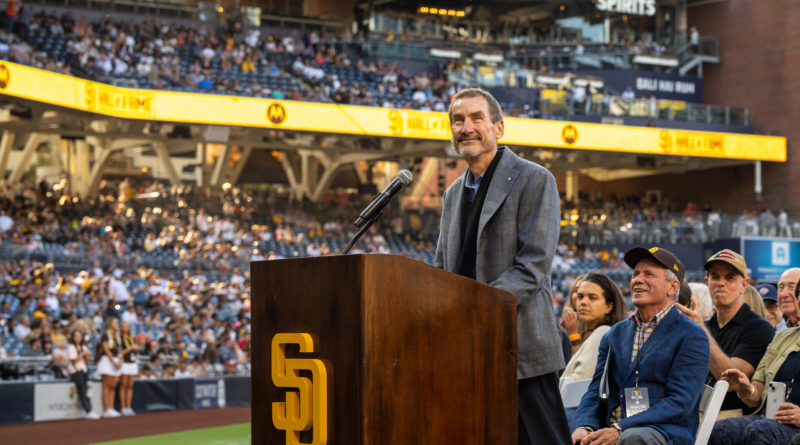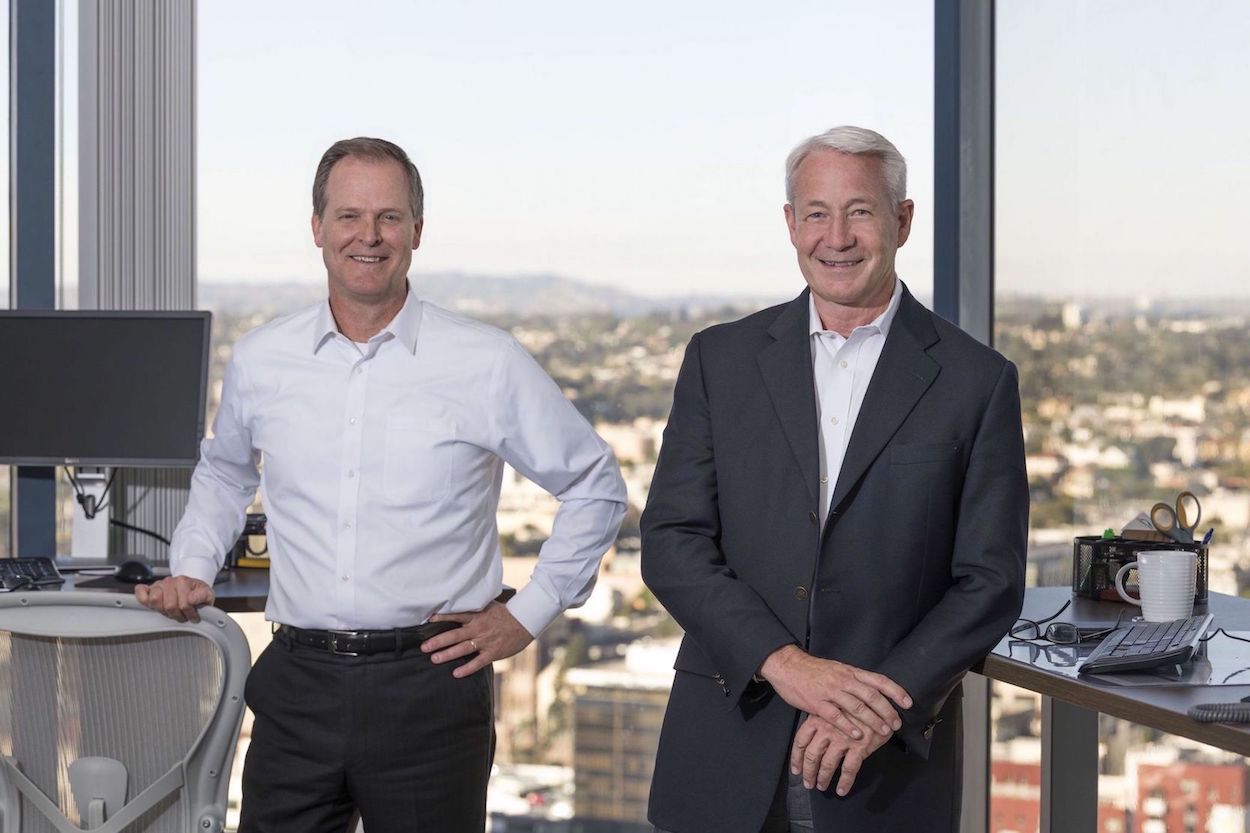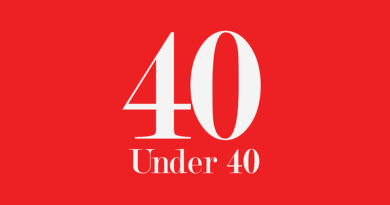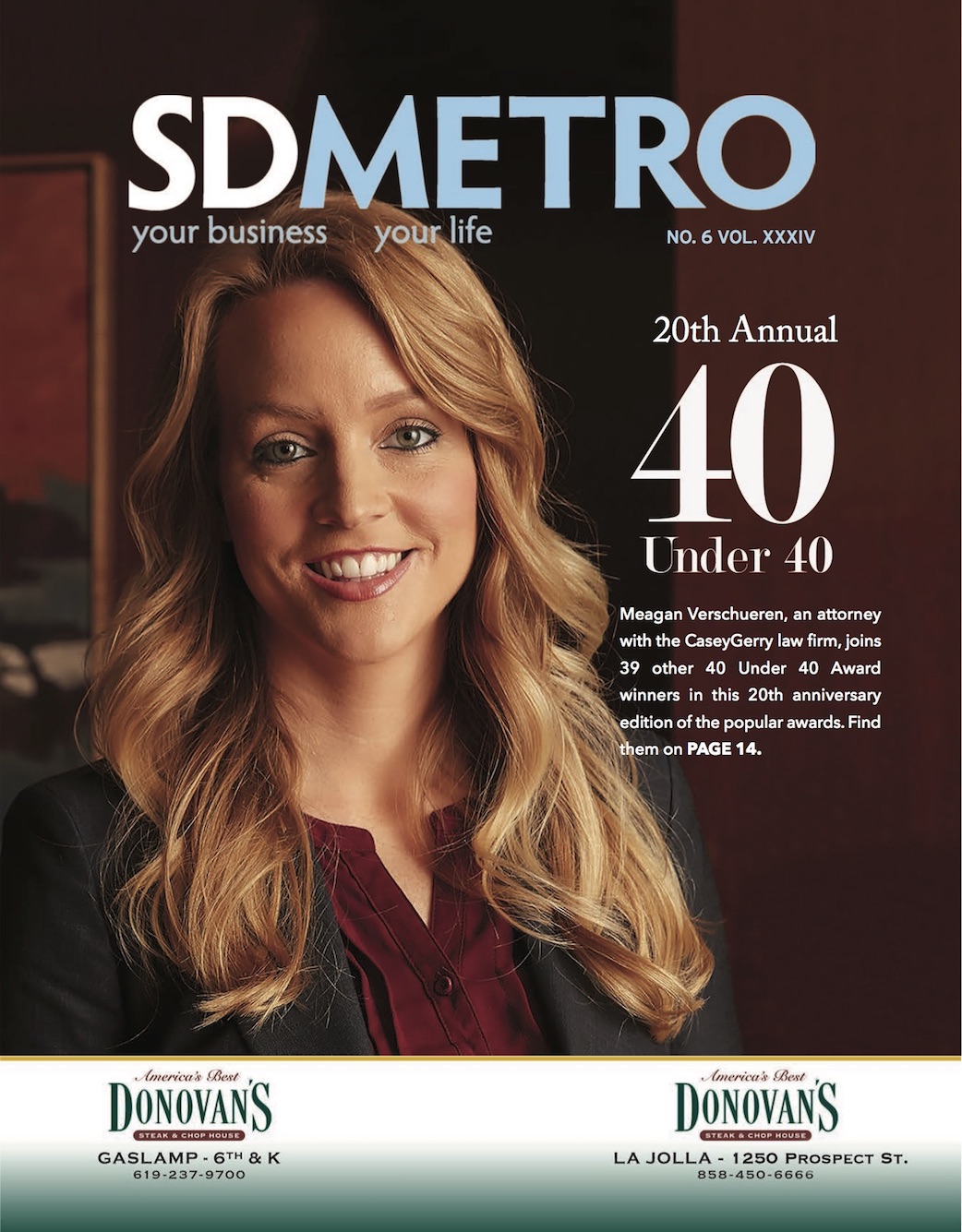CHANGING THE GAME: Peter Seidler’s Dual Mission
By Andrew Simmerman
It seems the entire baseball world is fascinated by Peter Seidler’s investment in the Padres, but San Diego leaders can tell you much more about what he’s done for the city off the field. Local executive Dan Shea, a close friend of Seidler since he moved to San Diego from Los Angeles in 2012, has seen first-hand Peter’s commitment to taking his Padres baseball club from the diamond to the community. “Peter gives of his time and resources, without question, like no other we’ve seen in this city. And he does it not by sitting behind a glass-walled boardroom with his checkbook, but by getting up close and personal with people who are suffering,” said Shea.
“There’s a Risk to Doing Nothing”
As owner of the San Diego Padres, how is it possible for Mr. Seidler to pay the third highest Major League Baseball (MLB) payroll while San Diego is MLB’s 4th smallest media market (amongst 30 teams)? How can doling out three of MLB’s historically largest contracts be a smart business decision? During the 2023 off-season the Padres made a giant splash, spending big to sign free agent all-star shortstop Xander Bogaerts while locking down a major contract extension for the team’s de facto captain Manny Machado, on top of adding extensions for all-stars Yu Darvish and Jake Cronenworth. And one can’t forget that the Padres are just two years into one of MLB’s largest ever contracts for its young superstar Fernando Tatis, Jr. What exactly is this guy Peter Seidler up to, MLB journalists have asked. Much to his disliking of the word, they can’t stop wondering: how is this level of spending sustainable? Even his fellow small-market MLB owners had something (not so nice) to say about what he was doing.

But it doesn’t make sense to the baseball and media worlds because they have it all wrong. Peter Seidler doesn’t just think about the sustainability of his baseball team, but rather the sustainability of the entire region of San Diego – a community that sometimes wonders if it deserves its America’s Finest City moniker, given its growing homeless population and other challenges. During a 2023 Spring Training media event, when Mr. Seidler was asked about the risk of carrying such a high payroll, he bluntly stated “There’s a risk to doing nothing.” While he may have been talking about how he runs the Padres, it’s quite clear this is how he approaches life. It’s what guides him to be one of San Diego’s most committed, charitable, and hard-working philanthropists.
Alleviating the Suffering of Homelessness
Next to his job as owner of the Padres, what fills Mr. Seidler’s time the most is addressing one of San Diego’s most intractable problems: homelessness. Each year, the Regional Task Force on Homelessness (RTFH) conducts its annual homeless count (which the U.S. Department of Housing and Urban Development requires every two years). On January 26, 2023, RTFH deployed over 1,600 volunteers to walk the streets of San Diego to learn about and count the region’s homeless population. After the numbers were tallied from the Jan. 26 count, it was reported that more than 10,000 individuals are unhoused, representing a 22% increase from the previous year. The percentage of unhoused women, seniors, and veterans also rose from the prior year, demonstrating how the crisis is getting worse faster than it’s getting better. It’s a problem that Seidler battles daily working with civic and elected leaders – no matter their political leanings, and without regard to who gets credit; the thought of credit never even enters his mind.
But any San Diegan who’s attended a Padres game at Petco Park or enjoyed a night out in the Gaslamp District the past few years doesn’t need a report to tell them the problem is growing; they can see how visible the crisis is through the increase in sidewalk encampments on the streets of downtown. It’s something Peter immediately noticed when he arrived in San Diego. On daily walks throughout the East Village — often during the darkest hours of the night – Seidler has for years experienced first-hand the tragic problem of homelessness and decided that compassion for people living on the streets and providing them with a brighter path trumped any other problems facing San Diego.
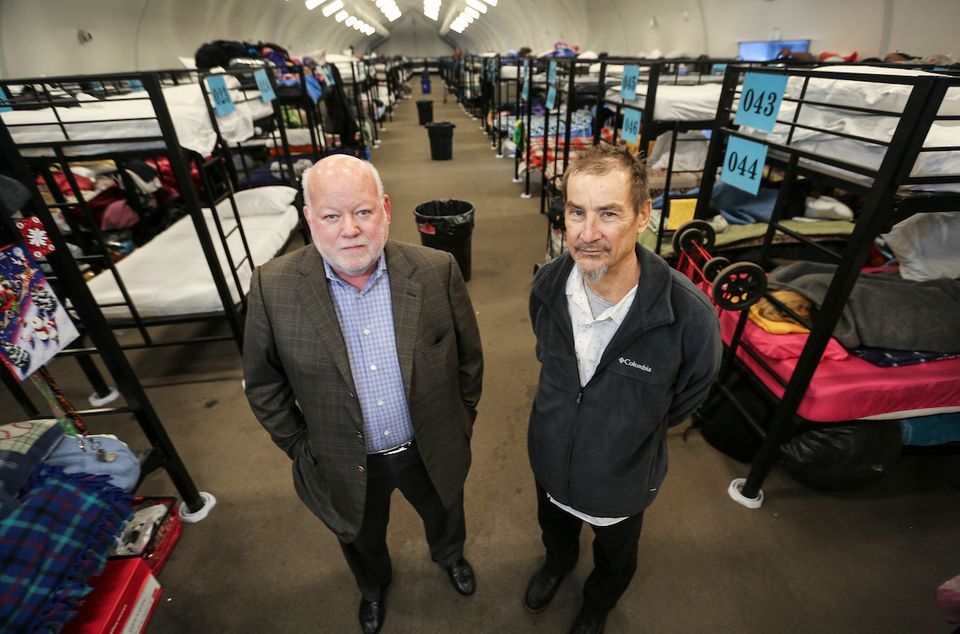
In 2005, business leaders and philanthropists Pat and Stephanie Kilkenny launched the Lucky Duck Foundation to raise funds and awareness for numerous charitable causes including homelessness throughout San Diego. In 2016 Seidler and Shea made a proposition to Pat and Stephanie: would they be open to focusing the work and resources of the Lucky Duck Foundation exclusively on homelessness? Understanding the magnitude of the issue themselves and seeing Seidler and Shea’s passion and vision, it wasn’t difficult for them to provide a resounding yes. “Peter and Dan brought such an unwavering passion and commitment to the plight of homelessness, it made great sense to join forces because, even though it sounds cliché, there is power in numbers and we knew we needed to bring a powerful force to address homelessness,” said Pat Kilkenny, co-founder, and chairman of the Lucky Duck Foundation. It is well known that Peter and Dan have different operating styles, particularly in dealing with the local political landscape. In a legendary “inside joke” that’s no longer “inside,” it has been said that Peter likes to “kill ‘em with kindness,” and Dan “just wants to kill ‘em.” “Their differing approaches actually complement each other toward their common goal of addressing homelessness in San Diego,” said Kilkenny.
Organizing the Private Sector to Tackle the Problem – Head on
Prior to the Lucky Duck Foundation’s pivot, Seidler and Shea assembled the “Tuesday Group” in 2016, a weekly convening of business and civic leaders to determine how the private sector can meaningfully address homelessness and instigate political will. In addition to Pat & Stephanie Kilkenny, most of the group’s members are business leaders, such as Tom Mulvaney of the local Mulvaney legal family and Chair of the Board at the University of San Diego; Mitch Mitchell, Senior Vice President, Chief Legislative Officer, SDG&E and Southern California Gas; Keith Jones, owner and managing partner, ACE Parking; Dan Novak, retired executive from Qualcomm and Cox Communications; Deborah Norwood Ruane, Founder and Managing Member at Norwood Development Strategies; Rick Bregman, President of Bank of America San Diego and National Co-Head of Healthcare Commercial Banking; Michael Brunker, former Executive Director of the Jackie Robinson YMCA and current President of Rotary Club 33; Alyce Fernebok, President of 4LNS, Inc., and Chair of the Board of Veterans Village; and until his death in 2021, Father Joe Carroll. Since forming, the Tuesday Group has not missed a weekly meeting – including all holidays, even Christmas & New Year’s Day. “Peter and the group are committed to meeting every single week.” says Drew Moser, Executive Director of the Lucky Duck Foundation & Tuesday Group. “We identify a few timely urgent topics and have a hearty discussion to determine what the Tuesday Group or Lucky Duck Foundation can do to influence change and help those in need. Sometimes we discuss strategy, sometimes we hear from national experts, and sometimes organizations that have received funding or are seeking funding from the Lucky Duck Foundation present the facts and identify areas the group can help,” adds Moser.
In a 2018 interview with SD METRO, Shea said that he and Seidler initially met for a discussion as to how, exactly, the homeless problem could be tackled. He said that they asked themselves: “What would we do in our own businesses?” They agreed that the issue should be approached “from the inside-out.” Over the course of several months, Shea said that he and Peter “consumed everything they could get their hands on” regarding the city’s efforts to combat the problem and concluded that it was not just a matter of money — as they had been told again and again. Rather, there were two primary issues that came into play: 1) leadership (or the lack thereof); and 2) the proper organization of resources. The group also studied local and national “Housing First” models, which they agreed was a good model. However, lacking city land and other resources, they concluded the “Housing First” model would leave homeless individuals, and even low-income citizens, without shelter — most likely sentencing them to life on the street for at least another five to 10 to 20 years. It was agreed that “Housing First” is a good model, but it should not be the “only model” because it needed more urgency to help people move off the street immediately.
As a result, the Lucky Duck Foundation purchased and installed several large industrial tent structures to provide shelter and critical services for more than 500 individuals nightly beginning in 2017. This resulted in a reduction of unsheltered homelessness for three consecutive years from 2017 to 2020 by nearly 30% at a time homelessness was rising substantially throughout the rest of California.
Since then, the Lucky Duck Foundation has funded, activated, and led numerous high-impact initiatives designed to immediately alleviate the suffering of homelessness. Such initiatives include:
• Funding more than 20 employment and job training programs across a multitude of industries including culinary training, construction, community beautification, driver training to help with other non-profit groups’ food rescue programs, trash cleanup, certificate programs, and more. All are designed to give individuals experiencing homelessness an opportunity to improve their earning power, employability, and housing.
• Providing lifesaving food and water to unsheltered homeless individuals. Since launching more than 1.7 million meals have been distributed with 700-1000 people per day receiving food and water. The program began in May 2020 after the Aqualia International Foundation, LTD recognized the need to fight hunger and homelessness and the life-or-death situation facing unsheltered individuals during the COVID-19 crisis. Aqualia asked the Lucky Duck Foundation to collaborate on the initiative and donated $500,000 to launch the program. Aqualia’s donation compelled many additional donations totaling in excess of $1 million.
• Purchasing and distributing more than 8,500 winter coats that convert into sleeping bags, which are made by individuals experiencing homelessness who are trained as seamstresses and hired to do the manufacturing. The program is another partnership with Aqualia and has resulted in the investment of over $1M to further alleviate the suffering of the unsheltered and homeless population.
• Removing more than 185 tons of trash in only 100 days via “cash for trash” which pays homeless individuals $2 for every bag of trash they remove from downtown San Diego.
• Supporting and facilitating “Lucky Ducklings,” a youth-led movement of more than 125 high school youth committed to volunteering, raising money, designing programs, learning about philanthropy, and understanding how they can play a constructive role in alleviating the suffering of homelessness.
• Convening leadership and research professionals from San Diego’s institutions of higher learning to focus and fund those institutions to undertake meaningful and actionable research into the myriad of issues surrounding homelessness.
One of the Lucky Duck Foundation’s most recent successes, a collaboration that includes the Rolf Benirschke Legacy Foundation, Union of Pan Asian Communities (UPAC), and Urban Street Angels, was the launch of a brand-new pizzeria and print shop called “Timmy’s Place” which trains and employs homeless youth at Urban Street Angels’ youth homeless center. The nonprofit social enterprise is expected to employ more than fifty youth per year. It is named “Timmy’s Place” after Mary & Rolf Benirschke’s son, Timmy, who overcame homelessness and addiction after living on the streets for more than five years. Timmy’s Place is open to the public and serves pizzas, sandwiches, pastries, coffees, and also provides catering. The print shop has a high-capacity automated screen-printing machine that can produce thousands of units as well as equipment to handle customizable products. Additionally, merchandise featuring designs, logos, and creations made by homeless youth will be displayed and sold. Timmy’s Place is projected to be a self-sustaining endeavor after one year.
Mr. Seidler has also looked for ways to involve his baseball team with the work of the Lucky Duck Foundation. In May of this year, Seidler and the Padres Foundation welcomed 580 guests to “Dinner on the Diamond,” a major fundraising event on-field at Petco Park which raised $1 million for homelessness. Proceeds were tripled by the Padres Foundation, Lucky Duck Foundation, and a group of Padres players led by Manny Machado, Joe Musgrove, and Yu Darvish. $500,000 was raised to address youth homelessness with an additional commitment of $500,000 from the Padres Foundation to address homelessness overall. Dinner on the Diamond | San Diego Padres (mlb.com)
“Peter takes the suffering of those experiencing homelessness incredibly personally. He guides us to always follow the facts, but for Peter it’s about the individual human being and their suffering,” says Dan Novak, member of the Lucky Duck Board of Directors, and retired executive from Qualcomm and Cox Communications. “Peter challenges us daily as individuals and as a community saying, ‘We can do better, we must do better.’ He leads with a sense of urgency and great focus on this humanitarian crisis. He believes everyone can do something to help,” said Novak.
Abiding Legacies for the Common Good
It’s in that spirit of believing everyone can do something to help that guides his belief that his MLB team should be an active participant in community work. And what better template for a San Diego Padre engaging in the community than following the footsteps of its most revered legend?
Native San Diegans will know that the exemplar for involvement in the community was “Mr. San Diego” himself – Tony Gwynn. Considered one of the greatest hitters in the history of the game, what he accomplished on the field is nothing short of impressive, as is everything he accomplished off the field. Tony’s work was not done in silo; rather, it’s always been a family enterprise, one the Gwynn Family continues today, carrying on his legacy and ensuring the name “Gwynn” is synonymous with San Diego, the Padres, family, and character. One of the many ways they accomplish this is through the Padres’ Tony Gwynn Community All-Star Program, which recognizes and honors San Diego’s youth who follow in his footsteps and support their local community. Roughly 9 scholars, high school students ages 13-18 working in conjunction with a local non-profit organization to support underserved segments of our community, are selected annually. Dr. Alicia Gwynn, high school sweetheart and wife of the late Mr. Gwynn, says that Peter never stops his support to ensure Tony’s legacy continues through generous giving and support of the Scholars program. “Anything I ask of him he’ll do. His charitable work is just over the top,” says Dr. Gwynn. “He’s such a giving person and just so unassuming. It doesn’t matter to him where you come from, he wants everyone to have the opportunity to succeed and is always generous in supporting others.”
In addition to their partnership with the Gwynn Family, the Padres have a deep and growing commitment to the greater San Diego community. The San Diego Padres Foundation makes a positive impact in the region’s overall quality of life by prioritizing children’s health and wellness, youth baseball and softball development, and supporting those who serve. In 2022, the Padres invested $3.3 million in monetary and in-kind donations distributed into San Diego and Baja communities going to over 500 local charities like Feeding San Diego, the Jackie Robinson YMCA, and Build a Miracle in Tijuana. The Padres and Padres Foundation have annually supported the Monarch School and its students experiencing homelessness through a variety of programs, including an annual Back-to-School Shopping trip. Padres staff, players and alumni give students one-on-one personal shopping support to help them pick out new pants, shirts, jackets, shoes, and other essentials. “Peter came to San Diego not just wanting to develop a winning professional baseball team, but to truly make a positive difference in the community,” shared Novak. “The Padres’ depth of involvement in the community is a testament to Peter’s leadership, determination, and commitment to San Diego,” he added.
Perpetual Optimism is a Force Multiplier
There’s still another important thing his critics don’t get: Peter is both a realist – understanding action must be taken to solve today’s problems – and an ardent optimist about what’s possible for San Diego’s future. Says Moser, “Good luck finding someone more committed and positive than Peter. His relentless focus on homelessness is unmatched, as is how much he gives of his time, talent, and treasure. And he does so out of a deep care and concern for the people on the street with zero concern for credit.”
Padres fans know about Peter’s optimism all too well – it’s something, in fact, that he’s most praised for by fans of the team. This off-season, when questioned about the sustainability of his spending he answered, “Let’s find a different word: sustainable. Putting a great and winning team on the field in San Diego year after year is sustainable.” When one of the Padres’ biggest stars, Fernando Tatis, Jr., came back from missing an entire year of baseball due to an off-field injury followed by an 80-game suspension for violating the MLB’s performance enhancing drug policy, Seidler told ESPN of Tatis, “He’s a good dude. He’s respectful, he’s likable, he cares about people, he loves San Diego. And for him to have let down the people of San Diego, it really hurt him. As it should have. He made a serious and regrettable mistake. Look, we’re all human. We make mistakes. A lot of times it’s if and how you bounce back. You know, he quietly, when nobody was looking, did a lot of things under the radar — getting the first surgery and then the second surgery were big, getting his body ready, getting his mind ready,” sharing “I believe in him.”
And Padres fans, it seems, believe in what Mr. Seidler is up to – this year Petco Park set a franchise record of sell-out crowds…in June, with more than half of the season to go. A new record has been set at nearly every home game since. In fact, as of August 24, 2023, they’ve already sold out 53 games which is a franchise record and more than twice the prior record of 26 sellouts (2022). This year they are averaging 40,395 fans per game, the 3rd highest in all of MLB. It’s expected the total number of fans this season will easily exceed the 3,000,000 mark and will likely set a new all-time franchise high in attendance, surpassing the record of 3,016,752 fans set in 2004, the first year of Petco Park.
Mr. Seidler’s on a Dual Mission
So, what can help his critics make sense of Mr. Seidler? What can explain the optimism of a man who is attempting to accomplish two things San Diego has never been able to do in its history – win a World Series and put an end to its homelessness crisis – while simultaneously confronting the often-brutal facts in front of him? You may or may not have heard about the Stockdale Paradox, a concept featured in Jim Collins’ bestselling business book Good to Great, which might just be the answer to understanding him: The “Stockdale Paradox” asserts that you must maintain unwavering faith that you can and will prevail in the end, regardless of the difficulties, and at the same time, have the discipline to confront the most brutal facts of your current reality, whatever they might be. Peter Seidler is a person who believes fervently that San Diego can accomplish both ambitious feats, and this belief guides his decision-making. Yet he’s simultaneously a realist, understanding the real-time challenges facing both that require action.
“Will he succeed?” one might be wondering. But that’s the wrong question. San Diegans should instead be asking “How can we follow his lead?” to make sure that he does. We might not have control of a baseball team to bring a World Series, but we can look to Peter Seidler as an inspiration for how to lead others and certainly to join his efforts to make San Diego deserve to be called America’s Finest City.
And, if it ever happens, let’s make sure the World Series Parade is one that no one will ever forget, especially the man who will have made it happen.
Seidler, 63, earned a bachelor’s degree from the University of Virginia, and an MBA from UCLA. He founded a private equity firm, the Seidler Equity Partners in Marina del Rey, and is the managing partner.
On November 18, 2020, Major League Baseball approved the transfer of the role of chairman of the Padres from Ron Fowler to Seidler, who purchased part of Fowler’s stake in the team to become the largest stakeholder.
Seidler is the grandson of Walter O’Malley, the legendary owner of the Los Angeles Dodgers who, along with Horace Stoneham, brought major league baseball to the West Coast in 1958, with the Dodgers moving from Brooklyn to Los Angeles, and Stoneham moving the New York Giants to San Francisco.
Andrew Simmerman is a non-profit leader, educator, entrepreneur, and communications professional currently serving as Director of Community Relations with KIPP SoCal Public Schools. He was born and raised in San Diego and is a lifelong Padres fan.

